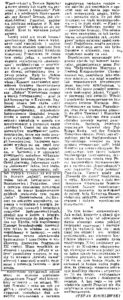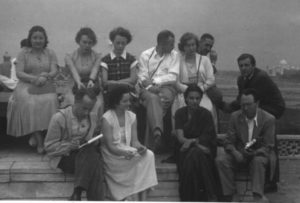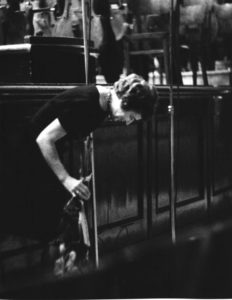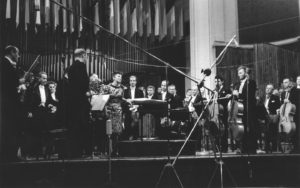On 18 June 1950 Grażyna Bacewicz’s Concerto for String Orchestra was premiered during the General Assembly of the Polish Composers’ Union. The Polish Radio Symphony Orchestra was conducted by Grzegorz Fitelberg. The work was immediately successful. Among numerous words of praise and enthusiastic reviews there emerged the question of the composer’s gender. Stefan Kisielewski wrote:
It can be said in all honesty that the honour of Polish composers was saved this time by a woman, Grażyna Bacewicz. (…) We finally felt a “red-blooded piece” of wholesome and delicious music written with a creative power that is truly virile.
Stefan Kisielewski, in Tygodnik Powszechny, 9 July 1950
- Fragment of a review of Concerto for String Orchestra by Stefan Kisielewski (Tygodnik Powszechny, 1950)
Allusions to the composer’s gender expressing a surprise that a woman was writing music comparable to works of men also appeared in other reviews, including those published abroad. As her works were increasingly performed in various countries, the composer sometimes would receive letters with the heading “Dear Mister Bacewicz” or “Cher Monsieur Grażyna Bacewicz”. Very few people in those days could believe that a woman could be a true composer and that gender did not really matter. It could, therefore, be said that Grażyna Bacewicz paved the way for other female composers. Today there are many such composers all over the world and gender as a criterion for assessment of works does not apply. Yet in those days a woman surprised even those who were sceptical. In 1951 Bacewicz was awarded the 1st prize at the International String Quartet Competition in Liège, Belgium. In 1952 the piece was included in the programme of the International Chamber Music Competition in Liège and in 1953 in the programme of a similar competition in Geneva. The stature of the artist was growing. She herself felt that she had a great creative potential she should not waste. Therefore, she took a difficult decision – to give up her performances as a violinist, limiting herself to performing just some of her own pieces. But she entrusted the premiere of her Violin Concerto No. 5, which took place in 1955, to Wanda Wiłkomirska. However, her temperament did not allow her to live a life of a recluse locked in her studio. She once vividly referred to this trait of her character in one of the stories from the collection Znak szczególny (A Distinguishing Mark). As we can read in it,
Nature – having graciously given me a talent for composition – also gave me something that enables me to cultivate this talent. I have a small, invisible engine thanks to which I can accomplish something in ten minutes, while others need an hour; thanks to this engine I run and not walk, I can write fifteen letters in half an hour, even my pulse is much faster than in other people, although I was born in the seventh month.
Grażyna Bacewicz, “Znak szczególny”, Warsaw, 1974, pp. 25–26.
This openness to the world resulted in many functions the composer performed with her customary commitment. In 1950 she was elected member of the Board of the Polish Composers’ Union and each subsequent assembly of the organisation confirmed this selection. In 1953–1956 she served as member of the Board of ZAiKS (Association of Stage Authors and Composers) and in 1954 she became member of the Commissions Committee at the Ministry of Culture and Art and member of the Culture Council. In 1952 she became member of the jury at the International Henryk Wieniawski Violin Competitions in Poznań, and in 1957 she chaired the jury at that competition. She was elected member of the jury at International Quartet Competition in Liège in 1952, and the International Marguerite Long-Jacques Thibaud Competition in Paris in 1953. She also received many awards and decorations [See Timeline].
In 1956 she travelled to India on behalf of the Polish Composers’ Union. The itinerary took her to Rome and Egypt. She describes her impressions from the journey in several stories from the Znak szczególny collection and, more privately, in letters to her brother Vytautas, whom she also gives composition advice, following his request.
- Grażyna Bacewicz in India (PWM)
In 1956 Bacewicz received the 2nd prize at the International Competition for Composers in Liège, Belgium, for her String Quartet No. 5. She travelled to Belgium for the award ceremony, visiting Paris on her way, though in a different role than before. Worthy of note are the circumstances of this journey as well as the commitments taken on there.
On 4–6 June 1955 the Polish Composers’ Union met in Warsaw for its 8th General Assembly, during which its Vice Presidents Tadeusz Baird and Kazimierz Serocki formulated a motion (adopted by a majority) recommending that the future PCU Board start talks with the “state authorities” to organise regular festivals to be called Warsaw Musical Autumn. We know, however, that the idea to go beyond Poland with contemporary music had many fathers and had taken several years to mature, primarily among composers who were members of the Polish Composers’ Union. There was a widespread sense of artistic barrenness and isolation from musical life in the West, from which came only very limited information about new phenomena and new works. Given the government’s revision of its cultural policy and the fiasco of the idea of socialist realism, regular contacts with various foreign institutions became an increasingly discussed possibility. However, in order for the project to succeed, it was not enough to persuade the Ministry of Culture and Art and the International Cooperation Committee. The decision had to be made on the highest level.
The Polish Composers’ Union elected its new authorities during the Assembly. Kazimierz Sikorski again became the organisation’s president. Tadeusz Baird and Kazimierz Serocki did not stand as candidates, probably because of the recommendation they had given in 1954 to Andrzej Panufnik before his overseas journey from which he had not returned to Poland. The new Vice Presidents elected by the Assembly were Grażyna Bacewicz, Father Hieronim Feicht, Witold Rudziński and Andrzej Dobrowolski. Soon after the Assembly Kazimierz Sikorski, as a representative of musicians, was invited to a meeting with the then President of Poland Bolesław Bierut. In a short conversation Bierut expressed his support for the organisation of the festival, the objective of which was a “confrontation” between Eastern and Western music – to the former’s advantage, as he thought. Thus began numerous meetings within the Polish Composers’ Union as well as the Ministry of Culture and Art, often featuring Grażyna Bacewicz, who was a member of the Organising Committee of the Festival. The organisers decided to advantage her visit to Liège to attend the prize-winners concert and her considerable knowledge of the French musical circles. The composer talked about it in a radio interview of 2 October 1956:
There’s a huge interest in our Warsaw festival and many people asked me for an invitation. But I wasn’t authorised to invite them, because the list of our guests had already been closed. I think that for the next festival we will have to invite more people and more journalists, because they were really interested, they simply begged me for an invitation to the festival. On my way to Belgium I visited Paris. I spent there some three weeks with my daughter. I was there on official business, I had to get in touch with the Orchestre National de la Radiodiffusion, which will come to our contemporary music festival. There were some purely organisational matters to arrange with them. I visited some people, including my former, beloved professor, Nadia Boulanger.
Grażyna Bacewicz became involved in the organisation of the first and subsequent festivals, which benefited her own oeuvre. The first festival, in 1956, featured performances of three of her pieces: String Quartet No. 4, Overture for orchestra and Concerto for string orchestra. Until 1970 each festival featured one of her works. A few months after the death of the composer, her Violin Concerto No. 7 was performed at the 1969 Festival, but in the years that followed performances of her works at the Warsaw Autumn became less frequent, although the Concerto for String Orchestra was presented three more times (1972, 1976, 1983) after the first festival. The 1973 Warsaw Autumn featured a performance of her ballet Desire, without the ending written by Bogusław Madey. The Overture was heard at the festival for the second time in 1996. Music for Strings, Trumpets and Percussion was presented at the Warsaw Autumn for the first time in 1959, with two more performances following in 1964 and 1993. String Quartet No. 7, apart from the 1966 performance was heard again in 1987. In 1977 the orchestral In una parte was performed and in 1984 – Divertimento for string orchestra. Grażyna Bacewicz’s music was heard at the festival for the last time in 2006, during a quartet marathon, which featured her String Quartet No. 4. The choice of the piece, logical from the point of view of the concept of the entire project, was part of a bigger whole, in which Bacewicz’s music was just one of the elements.
- Grażyna Bacewicz after the performance of her String Quartet no. 6, Warsaw Autumn 1960, phot. Andrzej Zborski (PWM)
- Grażyna Bacewicz after the performance of Musica sinfonica at the 1965 Warsaw Autumn, phot. Andrzej Zborski (ZKP)
From that moment Grażyna Bacewicz’s oeuvre was locked in a drawer labelled “classic”. And this did not fit in with the concept of the festival, which excluded even contemporary pieces that were reminiscences. As a matter of fact, Grażyna Bacewicz herself had a problem with describing her own place within the field referred to by the generalising name of “contemporary music”. She remained faithful to a specific system of values, she had her own style, but was too intelligent not to notice the changes brought about by the new generation of artists, who were not burdened with the mission of “catching up with Europe”, not to mention fighting the spectres of socialist realism. Nevertheless, she continued to score successes and enrich her sound language. In some pieces, e.g. the 1960 String Quartet No. 6, she came closer to serialism, and in a letter to her brother Vytautas, of 8 December 1962, she concluded melancholically:
Since music moves forward very quickly thanks to young composers, I know that I can only stand at the back, because I won’t outdo myself and true novelties will come from the young and not from me. But I’m not worried by this in the least. Everyone has their own place in this world. I do or, rather, would like to do what I can and that’s all.
Creative dilemmas and an attempt to overcome a crisis that could have affected Bacewicz with the emergence of a new generation of composers were described in his characteristic manner by Stefan Kisielewski in 1963:
Grażyna is too conscious an artist and her work is too monumental and consistently finished for her to suddenly panic like Rossini once did. On the other hand, she is too versatile musically, her ears are too open to everything not to be interested in what is new. There is still a long way to go before creative old age and ossification set in, so why not try to refresh her style while remaining herself. What suggests itself here is a path followed by many an ‘overtaken’ master: a path of compromise, that is synthesis. To introduce new, experimental paints or sets of paints into one’s palette – you can’t have too much of a good thing, can you!
Stefan Kisielewski, “Grażyna Bacewicz i jej czasy”, Kraków, 1963, p. 37.



